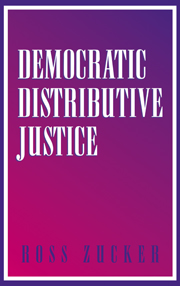Book contents
- Frontmatter
- Contents
- Acknowledgments
- 1 Democracy and Economic Justice
- Part I Unequal Property and Individualism in Liberal Theory
- Part II Egalitarian Property and Justice as Dueness
- 5 Whose Property Is It, Anyway?
- 6 The Social Nature of Economic Actors and Forms of Equal Dueness
- 7 Policy Reflections: The Effect of an Egalitarian Regime on Economic Growth
- Part III Egalitarian Property and the Ethics of Economic Community
- Part IV Democracy and Economic Justice
- Conclusions
- References
- Index
5 - Whose Property Is It, Anyway?
Published online by Cambridge University Press: 02 December 2009
- Frontmatter
- Contents
- Acknowledgments
- 1 Democracy and Economic Justice
- Part I Unequal Property and Individualism in Liberal Theory
- Part II Egalitarian Property and Justice as Dueness
- 5 Whose Property Is It, Anyway?
- 6 The Social Nature of Economic Actors and Forms of Equal Dueness
- 7 Policy Reflections: The Effect of an Egalitarian Regime on Economic Growth
- Part III Egalitarian Property and the Ethics of Economic Community
- Part IV Democracy and Economic Justice
- Conclusions
- References
- Index
Summary
Ethics of dueness for economic contributions usually neglect some forms of economic contributions and they, therefore, need to be reformulated. When the range of relevant contributions is taken into account, the ethics of dueness lead to a principle of egalitarian distribution of a part of national income. Reformulating these ethics also involves reconceiving property, for property is, among other things, an ethic of dueness for economic contributions.
Analysts often assume that economic contributions consist in a contribution to the production of a product. Yet the wealth of a nation does not derive only from being produced. Individuals also generate wealth in the course of their participation in – and contribution to – the ongoing circulation of commodities. The self-seeking individual, furthermore, contributes to wealth through his or her acts of consumption and exchange as part of a system of interdependence in the satisfaction of needs. Produced commodities will not have value – will not form particles of wealth – unless they are wanted or needed. If being wanted or needed is an essential component of a thing's economic value, then people may be due the value created by this contribution, and not only the value created by their productive actions.
When consumption-side contributions are incorporated into the logic of dueness, it is necessary to adjust the way they are formulated. The full source of the consumption-side contributions cannot be captured without paying attention to the process of social formation of consumption-side activities. The social formation of consumptive attributes, such as wants and needs, is part of the determination of economic value by wants and needs, and in this sense makes an indirect contribution to economic value.
- Type
- Chapter
- Information
- Democratic Distributive Justice , pp. 85 - 107Publisher: Cambridge University PressPrint publication year: 2000



